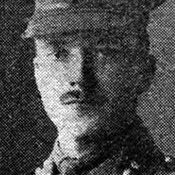No prayers nor bells: we shoot in scuttling shells
up and down the line. We go and return,
passing Arras, Béthune and Neuve Chapelle,
the Bois de Noulette, Messines and the Marne.
From Calais, past Flesquieres and Verdun,
with only the Alps in mind, we hurtle
through demented days, dusks gilded by sun
and black rain, in skirmishing battles
of the road. Through grey-day pallor we see
the brown, wide-open acres where they fought;
and sense the eerie emptiness reploughed.
At night, headlamps flare and brake lights bleed
sudden fear of hasty death into my heart,
spearing the tensioned tedium like a dart
whose aim is true, then redirected, then gone.
All around here they died for us;
now they lie under stones etched and erected
to the left and right, at Mametz and Loos;
at Langemarck, Vendhuile, Cambrai and Lens;
on either side of this paid-for auto-route,
dotting countryside, cresting horizons.
Between Le Touret and Richebourg L’Avoue,
on land once used by field ambulances,
thirteen thousand men of no known resting
place are remembered. It’s ground holding
my great uncle Jack, too. There, inside a fence,
under mown lawns, lies John Wesley Davies,
31, of the Royal Welch Fusiliers.
Further on, teams of gleaming windmills now stand
where once cold trenches were dug. In place of mud
and bloody hell, turbines mourn in silence:
generating clean warmth, dry light, hot food.
These are monuments also: testaments
to doomed youth on euro no man’s land.
In volleys to and fro, we, the fragments
of dead men’s shattered futures, pass fast and
glide, stuttering only at péage
queues. In our comfortable distress, our health
and holidays, our years, we have the breath
they did not have. In our petty rages
we drown the fading echoes of their cries,
their tender patience, their lingering goodbyes.





Recent Comments